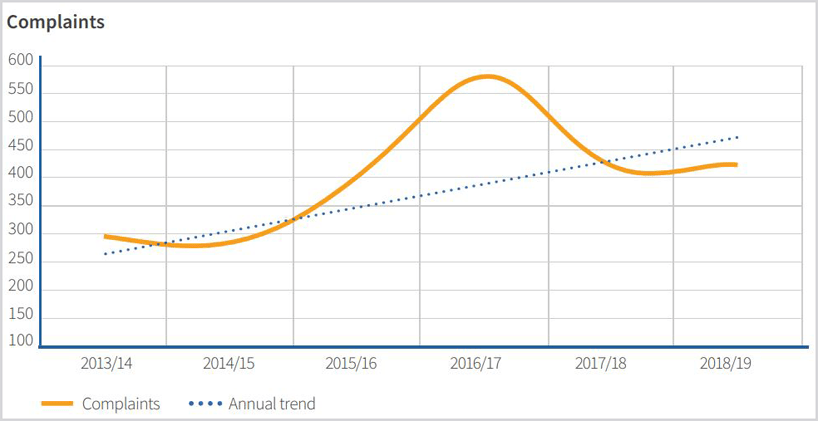Enquiries
The Inspectorate regularly receives contacts from community members, councils officers and councillors seeking advice or information or raising issues that fall outside the Inspectorate’s jurisdiction. Many contacts from the general public also result from referrals from other state government agencies and sector representative bodies and the Inspectorate endeavours to assist with enquiries where possible. While the majority of the enquiries are easily addressed, 595 specific matters were logged for future reference.
Complaints

The Inspectorate receives allegations about offences and breaches under the Act and has a responsibility to assess all complaints as part of its role. Complaints staff initially assess whether the allegation is within the Inspectorate’s jurisdiction. Complaints are then subject to an initial action to substantiate the allegation that forms the basis of the complaint, determine whether this constitutes a breach or offence under the Act or if it should be referred to another responsible authority. The Inspectorate has a target of receiving, acknowledging and assessing all complaints within five working days. There were 421 complaints accepted for assessment by the Inspectorate in 2018/19. This marginally exceeded the previous year’s complaint volume for a non-election year and is in line with the overall trend of an 11% increase per year calculated across the four year council term.
| How complaints are received | Percentage |
| In person | 3% |
| 27% | |
| Online form | 29% |
| 6% | |
| Phone | 35% |
Investigations
Twenty-nine investigations were completed for the year. While complaints are a main driver of investigations, the Inspectorate may launch an own motion investigation into any matter that potentially breaches the Act. As with the previous financial year, major investigations drew significant resources, and, as a result of a reduction in staff and the number of active significant and complex investigations, our capacity to undertake further investigations was reduced. These challenges have been offset by an improved initial assessment process, which has enabled complaints to be assessed and either dismissed, referred to other agencies or allocated to an investigator in a more efficient manner.
| Reporting period | 2015/16 | 2016/17 (election year) | 2017/18 | 2018/19 |
| Complaints | 397 | 576 | 417 | 421 |
| Investigations completed | 49 | 56 | 39 | 29 |
Coercive powers
Under the Act, the Chief Municipal Inspector has powers to require the provision of reasonable assistance, the production of documents or require a person to appear for examination under oath. For the 2018/19 period, the powers requiring reasonable assistance were exercised on 11 occasions. One person was required to appear for examination and 10 parties were required to produce documents or evidence.
Prosecutions and other enforcement action
The Chief Municipal Inspector has powers to initiate proceedings in various court jurisdictions, where it is deemed to be in the public interest to prosecute offences under the Act. One major case related to the South Gippsland Shire Council investigation where the coercive powers of the Chief Municipal Inspector were tested in the Supreme Court and found to be valid and properly exercised. While the majority of prosecutions relating to campaign donation return disclosures were completed in 2017/18, two additional candidates were brought before the courts in the past year for allegedly failing to disclose campaign donations. One case was concluded and the remaining matter is still before the courts.
Warnings
Warnings are issued for matters where a breach of the Act is substantiated but an alternative to a prosecution is considered to better serve the public interest. Eleven warnings were issued in 2018/19. Warnings are utilised as an educational tool in making recipients aware of their obligations under the Act and the consequences for further transgressions.
There were 8 prosecution cases in 2018/19, including:
- In July, a Wyndham councillor was prosecuted and convicted on 8 charges related to interest return non-disclosures.
- In October, a former Murrindindi Shire councillor was convicted on 5 charges of misuse of position related to making improper use of council information, and a Wyndham Council candidate was charged over making and using false documents submitted during the 2016 elections.
- In December, the former Central Goldfields Shire Council CEO was convicted on 5 charges of dishonestly obtaining for himself a financial advantage by deception, related to misuse of a corporate credit card.
- In April 2019, 2 candidates in the Moonee Valley and Moreland Council elections were charged over non-disclosure of information on their campaign donation returns, and the Supreme Court ordered that a South Gippsland resident be examined under oath following a hearing in the previous June.
- In May, a South Gippsland councillor was charged with misuse of position related to providing information to a local resident who was involved in a Supreme Court proceeding against the council.
Case study - prosecution
Updated

